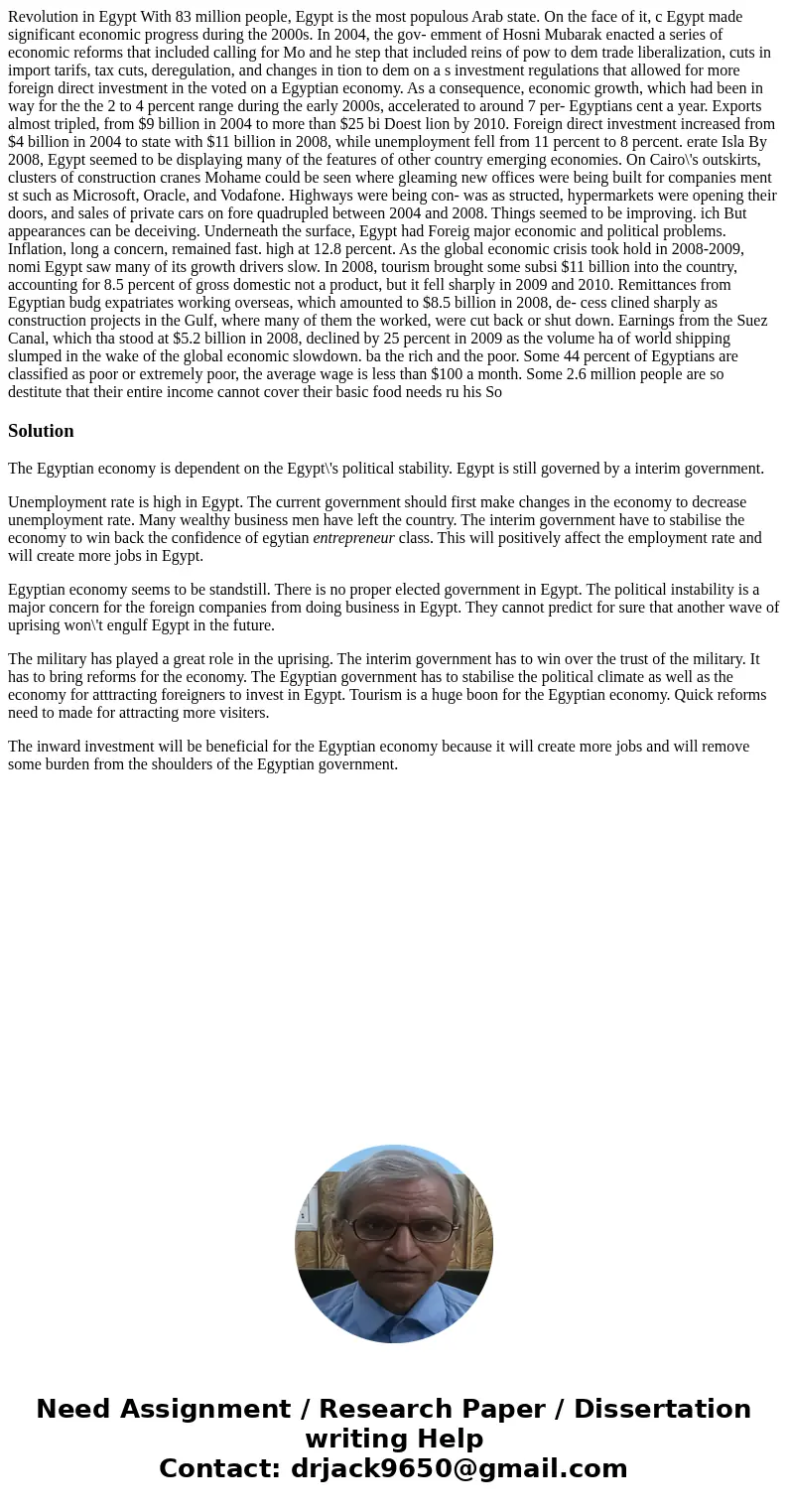Revolution in Egypt With 83 million people, Egypt is the most populous Arab state. On the face of it, c Egypt made significant economic progress during the 2000s. In 2004, the gov- emment of Hosni Mubarak enacted a series of economic reforms that included calling for Mo and he step that included reins of pow to dem trade liberalization, cuts in import tarifs, tax cuts, deregulation, and changes in tion to dem on a s investment regulations that allowed for more foreign direct investment in the voted on a Egyptian economy. As a consequence, economic growth, which had been in way for the the 2 to 4 percent range during the early 2000s, accelerated to around 7 per- Egyptians cent a year. Exports almost tripled, from $9 billion in 2004 to more than $25 bi Doest lion by 2010. Foreign direct investment increased from $4 billion in 2004 to state with $11 billion in 2008, while unemployment fell from 11 percent to 8 percent. erate Isla By 2008, Egypt seemed to be displaying many of the features of other country emerging economies. On Cairo\'s outskirts, clusters of construction cranes Mohame could be seen where gleaming new offices were being built for companies ment st such as Microsoft, Oracle, and Vodafone. Highways were being con- was as structed, hypermarkets were opening their doors, and sales of private cars on fore quadrupled between 2004 and 2008. Things seemed to be improving. ich But appearances can be deceiving. Underneath the surface, Egypt had Foreig major economic and political problems. Inflation, long a concern, remained fast. high at 12.8 percent. As the global economic crisis took hold in 2008-2009, nomi Egypt saw many of its growth drivers slow. In 2008, tourism brought some subsi $11 billion into the country, accounting for 8.5 percent of gross domestic not a product, but it fell sharply in 2009 and 2010. Remittances from Egyptian budg expatriates working overseas, which amounted to $8.5 billion in 2008, de- cess clined sharply as construction projects in the Gulf, where many of them the worked, were cut back or shut down. Earnings from the Suez Canal, which tha stood at $5.2 billion in 2008, declined by 25 percent in 2009 as the volume ha of world shipping slumped in the wake of the global economic slowdown. ba the rich and the poor. Some 44 percent of Egyptians are classified as poor or extremely poor, the average wage is less than $100 a month. Some 2.6 million people are so destitute that their entire income cannot cover their basic food needs ru his So
The Egyptian economy is dependent on the Egypt\'s political stability. Egypt is still governed by a interim government.
Unemployment rate is high in Egypt. The current government should first make changes in the economy to decrease unemployment rate. Many wealthy business men have left the country. The interim government have to stabilise the economy to win back the confidence of egytian entrepreneur class. This will positively affect the employment rate and will create more jobs in Egypt.
Egyptian economy seems to be standstill. There is no proper elected government in Egypt. The political instability is a major concern for the foreign companies from doing business in Egypt. They cannot predict for sure that another wave of uprising won\'t engulf Egypt in the future.
The military has played a great role in the uprising. The interim government has to win over the trust of the military. It has to bring reforms for the economy. The Egyptian government has to stabilise the political climate as well as the economy for atttracting foreigners to invest in Egypt. Tourism is a huge boon for the Egyptian economy. Quick reforms need to made for attracting more visiters.
The inward investment will be beneficial for the Egyptian economy because it will create more jobs and will remove some burden from the shoulders of the Egyptian government.

 Homework Sourse
Homework Sourse